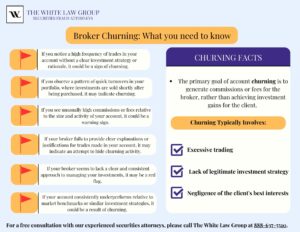Have you suffered investment losses due to too much trading in your brokerage account?
The excessive trading attorneys at The White Law Group continue to file FINRA arbitration cases on behalf of investors who have suffered losses as a result of excessive trading or churning by their broker.
Excessive Trading and Churning: What is it?

The Financial Industry Regulatory Authority (FINRA), the regulator who oversees brokerage firms, has rules concerning too much trading. FINRA Rule 2111 requires that broker-dealers must have a reasonable basis to believe the number of recommended transactions within a certain period is not excessive (i.e., that the investor’s account is not being churned). This is commonly called “quantitative suitability.” Essentially, it means that if an account is excessively traded it could not have been suitable for the client because the strategy could only benefit the advisor (through the generation of commissions) and not the investor.
To determine whether the level of trading in an account rises to the level of excessive trading or churning, the customer’s financial situation and investment objectives must be considered. While no one test is determinative in evaluating whether a specific amount of trading is per se churning, to prove such a claim you must demonstrate the following basic elements:
I. excessive trading,
II. control of the account by the financial advisor (you cannot hold a broker-dealer liable for your own excessive trading), and
III. intent by the advisor to defraud the customer.
How can I tell if my Broker is Trading too much?
When an account is examined to determine if the trading in the account is excessive, the type of account that is being analyzed is significant. For example, a high turnover ratio in a day trader’s account is meaningless, whereas the same turnover ratio in a retiree’s account may be considered churning.
To determine whether the trading is excessive considering the goals of the account, the most often used analysis is the calculation of a “turnover ratio”. A turnover ratio is the total number of purchases made in the account, divided by the average monthly equity in the account. That ratio is then annualized (by dividing the result by the number of months involved to get a per month ratio, and then multiplying that result by 12). An annualized turnover ratio of 6, which means that the equity in the account was invested 6 times in a year, is often considered too much trading in the typical customer account.
Control of the account refers to who is actually directing the trading. To prove a claim for churning, you must establish that the registered representative had actual or de facto control over your account.
Intent is often the easiest element to prove. Generally, if you can demonstrate the first two elements, the intent to maximize commissions at the expense of the client is obvious.
Warning Signs My Broker is Trading too Much
You can check for warning signs that your financial advisor may be excessively trading your account. Review your account statements and trade confirmations, and be sure to also check online accounts, for the following:
-
Is there any unauthorized trading, or investment purchases that you were unaware of, in your account?
-
Are there frequent in-and-out purchases and sales of securities that don’t seem consistent with your investment goals and risk tolerance?
-
Are there excessive fees in your accounts?
FINRA Sanctions firm for Excessive Trading
In 2020, Worden Capital Management faced sanctions from the Financial Industry Regulatory Authority (FINRA) due to supervisory failures linked to allegations of excessive trading in customers’ accounts. FINRA imposed charges totaling over $1.5 million on Worden Capital Management. This included approximately $1.2 million in restitution to customers whose accounts were excessively traded by the firm’s representatives and a $350,000 fine for various supervisory violations.
Between January 2015 and October 2019, Worden Capital and its CEO reportedly neglected to establish and enforce a supervisory system capable of ensuring compliance with FINRA’s rules regarding excessive trading. This failure led to Worden Capital’s registered representatives making unsuitable recommendations and excessively trading customers’ accounts, resulting in more than $1.2 million in commissions for the firm’s representatives.
As an example, one Worden Capital customer, whose account was traded for about a year, experienced a cost-to-equity ratio (breakeven point) exceeding 100 percent and realized losses of $118,490, inclusive of the $205,557 in commissions paid by the customer. Notably, Worden Capital apparently failed to investigate or halt the trading in this customer’s account and similar accounts, despite routinely receiving monthly reports identifying numerous customer accounts with signs of excessive trading.
FINRA expelled Worden Capital Management from the securities industry in July 2022.
How can I recover my investment losses from too much trading?
The excessive trading attorneys at The White Law Group continues to file FINRA arbitration cases on behalf of clients who have suffered losses because of too much trading in their brokerage accounts. To recover losses caused by excessive trading by your broker, you can initiate a Financial Industry Regulatory Authority (FINRA) claim. Our experienced securities attorneys can help you.
Excessive Trading Attorneys and the FINRA Arbitration Process
The first step in filing a FINRA arbitration claim is to identify and gather evidence that your broker engaged in excessive trading, which is a violation of securities laws. This typically involves reviewing your account statements, trade confirmations, and any communication with your broker.
The excessive trading attorneys at The White Law Group can help you assess the strength of your case, advise you on your options, and guide you through the process. If we believe you have a valid claim, you can initiate the process by filing a complaint with FINRA. This usually involves paying a filing fee.
FINRA will appoint a panel of arbitrators to hear your case. These arbitrators are usually experienced professionals from the financial industry and the legal field. Both parties involved in the dispute will go through a discovery process where they exchange relevant documents and information. This process helps both sides understand the strengths and weaknesses of their cases.
A formal hearing will be scheduled where both parties present their cases before the arbitration panel. Your attorney will argue that the broker’s excessive trading caused your losses and that it was done without your consent or in your best interest. The arbitrators will review the evidence and arguments presented and make a binding decision. This decision can include financial awards to compensate for your losses. Many cases do settle before going to the formal arbitration hearing.
If you win the case, the losing party is legally obligated to pay the awarded amount.
Free Consultation with National Securities Attorneys
If you believe you your broker has traded too much in your brokerage account, please call the excessive trading attorneys of The White Law Group 888-637-5510 for a free consultation.
The White Law Group, LLC is a national securities fraud, securities arbitration, investor protection, and securities regulation/compliance law firm dedicated to helping investors in claims in all 50 states against their financial professional or brokerage firm. Since the firm launched in 2010, it has handled over 700 FINRA arbitration cases.
Our firm represents investors in all types of securities related claims, including claims involving stock fraud, broker misrepresentation, churning, unsuitable investments, selling away, and unauthorized trading, among many others.
With over 30 years of securities law experience, The White Law Group has the expertise to help you recover their investment losses. For more information, please visit our website, whitesecuritieslaw.com.








